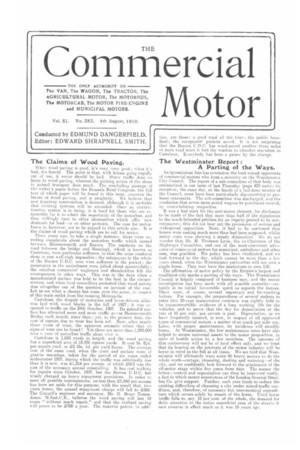The Westminster Report : A Parting of the Ways.
Page 1

If you've noticed an error in this article please click here to report it so we can fix it.
An ignominious fate has overtaken the loud-voiced opponents of commercial motors who form a minority on the Westminster City Council. The report of a sub-committee of that body was summarized in our issue of last Thursday (page 429 ante) ; its reception, the same day, at the hands of a full-dress muster of the Council, must have been particularly disconcerting to prohorse extremists. The sub-committee was discharged. and the resolution that seven more petrol wagons be purchased carried, by overwhelming majorities.
It was a bad start for the anti-motor element, for disclosure to be made of the fact that more than half of the signatories to the much-belauded petition for all inquiry proved to be nonratepayers ; this did not bear out the pretension of :saviours and widespread opposition. Next, it had to be confessed that horses were coating much more than had been supposed, whilst motor costs were showing a steady diminution. We do Lot wonder that Mr. H. Thomson Lyon, the es-Chairman of the Highways Committee, and one of the most-consistent advocates of commercial motors for municipal, ambulance and other rises, was gratified. His policy has been vindicated, and we look forward to the day, which cannot be more than a few years ahead, when the Westminster authorities will not own a single horse. They now have the misfortune to own 110. The affirmation of motor policy by the Empire's largest and wealthiest city marks a parting of the ways. The Westminster Council is largely composed of business men, and the recent investigation has been made with all possible austerity—certainly in no initial favourable spirit as regards the motors. There were, of course, several important and far-reaching factors. For example, the preparedness of several makers to enter into 10-year maintenance contracts was rightly held to be incontrovertible evidence of a long working life for the vehicles, and to prove that the day for depreciation at the rate of 15 per cent, per annum is past. Depreciation, as we have frequently insisted, is now, in respect of all approved types of commercial motors, a matter of so much per mile run. Later, with proper maintenance, its incidence will steadily lessen. At Westminster, the low maintenance rates have also helped to secure universal assent to the motor proposition, in spite of hostile action by a few members. The outcome of this controversy will not be of local effect only, and we trust that its bearing on the interests of the motor industry will he borne in mind to the full at all times. We are told that Westminster will ultimately want some 50 heavy motors to do the whole work—cartage, cleansing, dusting and watering—of the city, and we confidently look forward to the attainment of the all-motor stage within five years from date. The sooner the better ; control and organization can then be improved vastly, a fact to which recent experiences of the London General Omnibus Co. give support. Further, each year tends to reduce the existing difficulties of cleansing a city under mixed-traffic condition, and, therefore, of necessary but uneconomical expenditure which occurs solely by reason of the horse. Until horse traffic falls to, say, 10 per cent. of the whole, the demand for daily attention to the entire superficial area of the streets it uses remains in effect much as it. was 10 years ago.




















